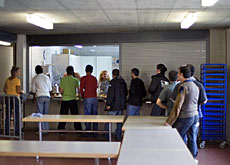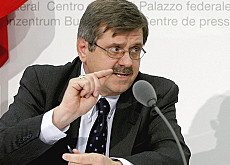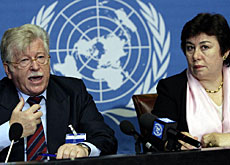Calmy-Rey urges better foreigner integration

Immigration should be seen as something that enriches society rather than just a "threat" or "cost", argues Swiss President Micheline Calmy-Rey.
She made an appeal for the better integration of foreigners in Switzerland at the opening of a migration conference in Bern on Tuesday.
“We should not be afraid of foreigners, as Switzerland is a strong country and our identity and values are deeply rooted,” said Calmy-Rey, who is also foreign minister.
Just over 20 per cent of Switzerland’s population are foreign – representing around 1.5 million people.
Foreigners and immigration have been one of the dominant themes in the run-up to October’s parliamentary elections. The Swiss People’s Party made major gains in the poll partly due to its hard-line stance against foreigners.
Thomas Greminger, senior official at the foreign ministry, agrees that the current public debate in Switzerland over migration had “very negative connotations”.
“People think immediately of criminal foreigners or abuse of the asylum system,” he told swissinfo. “All the positive components, which have helped develop our economy, for example, are not brought into the picture.”
In her speech, Calmy-Rey said the Swiss tended to focus on threats to their cultural identity and social cohesion, which she described as very serious concerns.
But she said “the enrichment of the host society” should also be taken into account.
Calmy-Rey picked out Nestlé and Swatch as two successful Swiss companies that had been founded by German and Lebanese immigrants, respectively.
Tougher regime
Switzerland faces similar migrant challenges to those of other countries in Europe. In recent years it has received large numbers of asylum seekers, the majority of whom do not qualify for refugee status or residence in Switzerland.
Asylum and foreigners laws have been progressively tightened since the middle of the 1980s. In the latest step the justice ministry last week called for additional tougher measures against deserters seeking asylum.
“Over the past ten years certain political parties do not want to recognise that there are problems concerning criminality and young people not being integrated,” Eduard Gnesa of the Federal Migration Office said.
Calmy-Rey replied that walls and barbed wire are powerless against men and women’s desire for freedom and security.
“The toughest asylum laws have no other impact than to make migration flows illegal,” she said.
To exploit the full potential of new immigrants in Switzerland “we should pay particular attention to the integration of foreign populations,” she said.
Integration needs common commitment by the political world and society, according to Calmy-Rey.
Partnerships
As part of its migration strategy, Switzerland is setting up partnerships with individual countries and regions, focusing on developing economic, social and medical programmes. Pilot projects have been launched with Bosnia- Herzegovina, Serbia and Kosovo.
“They could include an improvement in migration management capacities and a serious dialogue on return issues,” explained Greminger.
In the long term, the foreign ministry also plans to launch projects to improve security in conflict zones and regions where human rights are violated.
But their implementation should be urgently accompanied by the reintroduction of a quota system for “particularly vulnerable” refugee asylum seekers, said Calmy-Rey.
swissinfo, Simon Bradley
The foreign population of Switzerland in 2006 was 1,523,586 people. They represent 20.4% of the total population.
There are believed to be around 130,000 illegal immigrants in Switzerland.
Last year Swiss voters approved a law limiting immigration for citizens outside the EU and the European Free Trade Association (Efta) to highly skilled labour.
It also aims to encourage integration, in particular by language courses, while cracking down on human trafficking and marriages of convenience. Foreigners have to make efforts towards integration, according to the spirit of the law.
Regulations were also tightened under the amended asylum law in 2006. It allows those awaiting deportation to be detained for longer periods, cuts social welfare payments to rejected asylum seekers and excludes from asylum procedures people arriving without identity papers.
In her speech, Calmy-Rey said Switzerland should consider creative ways of opening up its labour market. She proposed offering “controlled access” to young apprentices from abroad who would later return home afterwards.
But Swiss unions and business associations said the plan wouldn’t work. They argued that apprentice candidates from developing countries come from systems that are too different and that they wouldn’t be able to integrate fast enough. They also have to return home, which still leaves a shortage of specialist workers.
In Switzerland around 20,000 young people have to wait up to one year for an apprenticeship position, they declared, and those the most disadvantaged from the proposed scheme would be the children of immigrants living in Switzerland.

In compliance with the JTI standards
More: SWI swissinfo.ch certified by the Journalism Trust Initiative












You can find an overview of ongoing debates with our journalists here . Please join us!
If you want to start a conversation about a topic raised in this article or want to report factual errors, email us at english@swissinfo.ch.